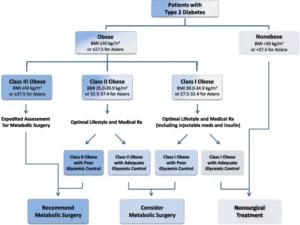Millions of individuals worldwide are impacted by Metabolic Disease the continually expanding health issue of obesity. A person who has this chronic condition, which is characterized by excessive body fat, is substantially more likely to develop type 2 diabetes, hypertension (high blood pressure), and dyslipidemia. If ignored, these illnesses can have serious effects on a person’s health, lower their quality of life, and even pose a risk for life-threatening complications.
Obesity and Metabolic Diseases: A Connection
Obesity and metabolic illnesses are intricately linked. Unhealthy levels of fat, particularly around the waist, interfere with the hormones’ regular balancing and operation. Insulin resistance is a significant risk factor for type 2 diabetes and other metabolic illnesses and is brought on by this disturbance. Additionally, obesity raises the risk of heart disease by causing high blood pressure and abnormal cholesterol levels.
What are metabolic surgery and obesity?
Surgical techniques intended to promote significant weight loss and treat metabolic problems are frequently mentioned when discussing obesity and metabolic surgery. These procedures, which are also referred to as bariatric surgery, are primarily intended to reduce the quantity of food that the stomach can store and modify the digestive process. This change causes substantial weight reduction and a noticeable improvement in a number of metabolic diseases.
There are a number of surgical options, such as gastric banding, sleeve gastrectomy Metabolic Disease, and gastric bypass, among others. The patient’s overall health, the level of obesity, and the existence of metabolic problems all influence the type of operation that is performed.
What exactly do the rules state?

In contrast to the STAMPEDE investigators, the most recent metabolic surgery guidelines choose a BMI criterion of 30 kg/m2 (27.5 kg/m2 for Asians). For all patients with a BMI under 40 kg/m2, they also recommend a first-line glycemic management strategy of medication and lifestyle changes. According to the management algorithm (see figure), doctors should consider surgery for class I obese patients (30.0-34.9 kg/m2) who have poor glycemic control despite nonsurgical treatments and for class II obese patients (35.0-39.9 kg/m2) even if they have adequate glycemic control. The ADA and the UK’s National Institute for Health and Care Excellence both adopted the same thresholds in the obesity management part of the 2017 update to the Standards of Care.
How Do Metabolic Surgery and Obesity Work?
These surgical techniques either reduce the amount of food consumed, result in nutritional malabsorption, or a combination of the two to work. The procedure alters the way nutrients are absorbed by shrinking the stomach and, in certain circumstances, rerouting or removing the small intestines.
The Effects of Metabolic Surgery and Obesity
Obesity and Metabolic Disease have a significant and life-altering influence. The most obvious and immediate effect is weight loss. The advantages of this operation go far beyond weight loss, though.
Following surgery, many patients notice significant improvements in their metabolic illnesses. For instance, people with type 2 diabetes frequently report a significant drop in their blood glucose levels after surgery, sometimes even experiencing a full remission of the condition Metabolic Disease. Similar to this, surgical intervention significantly improves disorders including hypertension and dyslipidemia.
Options for Obesity and Metabolic Disease Treatment
Dieticians, physical therapists, psychologists, and medical specialists are just a few of the healthcare providers who may be involved in the multi-disciplinary approach to treating obesity and metabolic illnesses. The first line of treatment typically entails lifestyle adjustments such maintaining a healthy diet, getting regular exercise, and altering negative behavior.

In order to treat obesity and related metabolic problems, medication may be administered when traditional weight loss techniques and lifestyle modifications fall short of the intended outcomes. Obesity and metabolic surgery, however, may be an option for those who are extremely obese or whose obesity has contributed to serious health problems including heart disease or type 2 diabetes.
In general, restrictive operations like laparoscopic adjustable gastric banding (LAGB), malabsorptive surgeries like biliopancreatic diversion, and combination surgeries like Roux-en-Y gastric bypass (RYGB) can be used to treat obesity and metabolic illnesses.
Metabolic surgery for obesity at reputable facilities
Numerous reputable hospitals provide cutting-edge medical procedures, such as obesity and metabolic surgery. The facilities provide complete surgical options for treating obesity and related metabolic problems thanks to a committed staff of knowledgeable and experienced surgeons Metabolic Disease. The surgeons take a patient-centered approach to care, making sure that the treatment plan is customized to the person’s unique medical needs and background. They pay attention to things other than the actual surgery. The patient’s long-term health and wellbeing are also given priority. To promote long-term weight loss and improved metabolic health, this comprehensive care includes post-operative nutritional counseling and support groups.
What are the shortcomings?
Procedural shortcomings
Although there were a few surgical patients who needed a second surgery (6% of the gastric bypass group and 2% of the sleeve gastrectomy group in STAMPEDE, for example), complication rates were really quite low in the studies that demonstrated the effectiveness of the procedures in diabetes patients Metabolic Disease. At the 5-year follow-up, anemia was prevalent, affecting 28% of the gastric bypass group and 49% of the sleeve gastrectomy group, as opposed to 16% of the medicinal therapy group.

Reoperations and anemia were the most prominent Metabolic Disease consequences at short- and long-term follow-up, respectively, in other studies that showed similar outcomes. Additionally, nutritional deficiencies are a well-known side effect of bariatric surgery, with patients typically needing lifelong monitoring and vitamin and mineral supplements. In fact, despite being required to take supplements after surgery, patients in the surgical group had higher rates of nutritional deficiencies, particularly in iron, albumin, calcium, and vitamin D, according to the Diabetes Surgery Study’s 2-year follow-up. This experiment also indicated a higher chance of developing secondary hyperparathyroidism following surgery, which was observed in 17% of patients.
In conclusion,
Obesity and metabolic surgery is a lifesaving procedure for people who are suffering from extreme obesity and related metabolic problems. This procedure is often considered after more conventional techniques of weight loss have failed for many people. It provides these people with an opportunity to regain control over their health and lead satisfying lives.
Reputable hospitals employ committed medical staff who are committed to offering the finest care possible Metabolic Disease, making them good options for people thinking about obesity and metabolic surgery. A good recovery and a healthy future are guaranteed thanks to the integrated, holistic approach to patient care, which makes sure patients get the attention they require before to, during, and after the procedure.



















